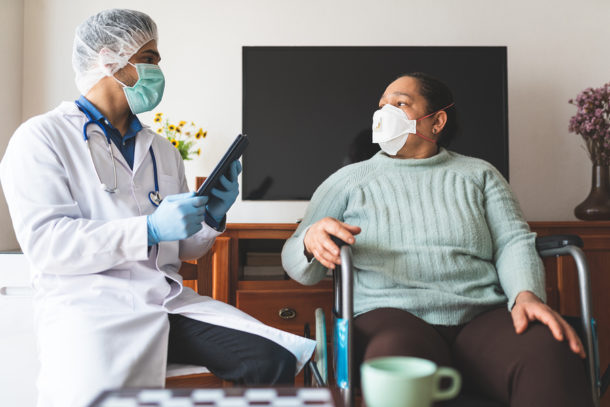Covid-19 has upended life globally, but perhaps no more than for the elderly, children and disabled individuals receiving health care services in their homes, and for the caregivers themselves. Ten million Americans rely on home health services for such disparate health needs as speech therapy, autism services, wound care and personal hygiene.
For those over age 65, who comprise the overwhelming majority of Covid fatalities, the severe consequences of a deadly virus are exacerbated by the isolation it is imposing upon them. While families are sheltering at home together, homebound elderly are most often alone. Sheltering and distancing guidelines may be keeping friends and even family members from visiting.
Social activities, such as attending lectures, going to movies and playing Mah-Jongg with friends, have been curtailed. The result of this is social isolation that leads to an increase in mental health conditions such as anxiety, depression, and suicidal ideations. For those with conditions such as Dementia or Alzheimer’s, there is increased confusion and sadness due to the lack of comprehension and recall about the current situation.
The requirement to isolate and avoid going out makes medical care of the elderly and more fragile populations problematic. For example, while individuals managing health conditions such as diabetes or high blood pressure may be able to live relatively independently, going grocery shopping, obtaining medications and maintaining the activities that sustain health such as walking and exercise are much more challenging, if not impossible.
For those in residential facilities such as nursing homes and assisted living facilities, social distancing may mean being isolated in their rooms alone almost 24/7, with brief interactions from staff to receive food and medicine. The lack of mental stimulation, physical activity and social interaction are harbingers of mental health breakdown, to which the elderly are already more prone. It is sobering to consider that this is the punishment imposed upon prison inmates whose actions suggest they are a danger to others.
With recent changes to the Medicare program addressing the Covid crisis, many hospitals and doctors have pivoted to using telehealth and virtual appointments to see patients, which can address many issues and keep medical care current. Technical challenges are prevalent with many elderly patients struggling to use face-to-face telehealth platforms. Medicare is allowing individuals to receive services via phone, without the visual component, but this certainly has its limitations. Additionally, Medicare has revised the requirements for some coverage decisions, no longer demanding face-to-face visits and allowing patients to receive longer supplies of prescriptions.
Home health care agencies are deploying skilled care to homes for some services, but not others. For example, they are taking samples of body fluids for testing; however, the necessary physical examinations are lacking, assessments for memory loss and functioning are impacted by phone-only options and routine medical exams such as colonoscopies and scans are not being performed. This may result in increased health issues and illnesses down the road.
Meanwhile, health care providers are facing their own challenges. The Centers for Disease Control has issued guidelines for care that include daily temperature checks and personal protective equipment like N95 respirators and latex gloves. Many home health workers fear for their safety and the safety of their families should they bring the virus home with them.
While children appear to be less at risk from the virus itself – they comprise just 2% of confirmed cases in the U.S. and incur mild-to-moderate symptoms 90% of the time – children with significant healthcare needs face daunting challenges. Cloistered at home and without the support structure of school, they are now entirely reliant on their parents and those home care providers who continue to visit. Limited home care may mean health regression or the onset of new health challenges.
Home health care strategies have been forced to shift radically because of Covid-19 and new long-term approaches will be required as the ramifications of the virus linger beyond 2020 into the foreseeable future. For now, its effect on home care patients and caregivers has been profound – and the full extent of it has yet to be revealed.
